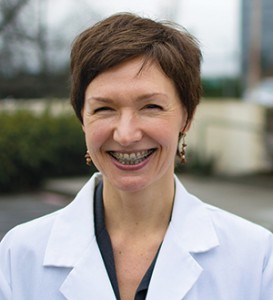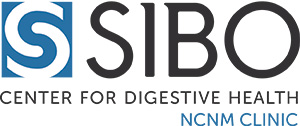 Dr. Allison Siebecker has a personal reason for her interest in Small Intestine Bacterial Overgrowth (SIBO). She had suffered digestive problems for years but tried to make the best of it while going through medical school at NCNM. Then, after a particularly rough patch, she decided to do more research, including re-reading a book she had first discovered as a student in one of Dr. Steven Sandberg-Lewis’ gastroenterology classes. The book, by the late Canadian researcher Dr. Elaine Gottschall, is called Breaking the Vicious Cycle. It details many of the symptoms of SIBO and includes information on a diet that has proven effective in battling the bacterial bloom associated with the disorder.
Dr. Allison Siebecker has a personal reason for her interest in Small Intestine Bacterial Overgrowth (SIBO). She had suffered digestive problems for years but tried to make the best of it while going through medical school at NCNM. Then, after a particularly rough patch, she decided to do more research, including re-reading a book she had first discovered as a student in one of Dr. Steven Sandberg-Lewis’ gastroenterology classes. The book, by the late Canadian researcher Dr. Elaine Gottschall, is called Breaking the Vicious Cycle. It details many of the symptoms of SIBO and includes information on a diet that has proven effective in battling the bacterial bloom associated with the disorder.
Siebecker adopted Gottschall’s “Specific Carbohydrate Diet,” which starves the bacteria population back to manageable levels while still providing the body with its needed nutrients. She found relief from her main symptoms within 24 hours and since has devoted years of research to learn as much as she can about SIBO, share what she knows and help more people find an answer for their gastrointestinal problems.
“I am totally committed to this because I know there are so many people who suffer from IBS and SIBO,” she said.
 Now, as NCNM Clinic’s SIBO Center gains visibility for its research and innovative combination of diet, herbal and conventional antibiotics, Siebecker continues to evangelize. She has become an expert in the field, including being the first researcher to integrate Gottschall’s work with the current research on SIBO. A symposium at NCNM earlier this year drew both MD and ND experts together on SIBO for the first time.
Now, as NCNM Clinic’s SIBO Center gains visibility for its research and innovative combination of diet, herbal and conventional antibiotics, Siebecker continues to evangelize. She has become an expert in the field, including being the first researcher to integrate Gottschall’s work with the current research on SIBO. A symposium at NCNM earlier this year drew both MD and ND experts together on SIBO for the first time.
“There are so many questions we want to study,” she said, “I have decided to focus my entire career on this.” Siebecker devotes a chunk of her time to doing interviews and podcasts in addition to her clinical and research work. Meanwhile, she’s also writing a book on the subject, all in the desire to educate healthcare practitioners and patients that there is hope for the distress of IBS and SIBO.